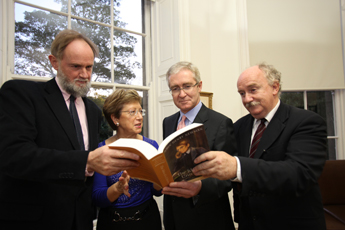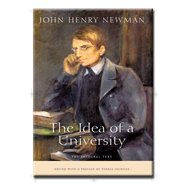Posted 15 October 2009
New and authorative edition of Newman’s The Idea of a University published by UCD International Centre for Newman Studies
First rector of the Catholic University, John Henry (later Cardinal) Newman was already a controversial figure whose writings and beliefs had led to his religious conversion and his move to Ireland when he delivered the Discourses on the Scope and Nature of University Education in Dublin in 1852. This first form of The Idea of a University was to become his legacy to Dublin and a source of great academic and intellectual debate ever since.
Now republished by the UCD International Centre for Newman Studies, the 2009 edition of Newman’s Idea of a University is an unabridged text with a preface by Teresa Iglesias, Professor Emeritus of Philosophy. “This publication brings back to prominence John Henry Newman’s intellectual prowess and his provocation as an inspirational thinker and an educationalist.” Dr Padraic Conway, Director of the International Centre for Newman Studies said at the launch of the publication.

Pictured at the launch (L-R): Dr Joe Dunne, St Patrick's College, Teresa Iglesias, Professor Emeritus of Philosophy, Dr Hugh Brady, President UCD and Prof Declan Kiberd
Although Professor Declan Kiberd claimed not to agree with all of Newman’s writings, he paid compliment to the great 19th century educationalist and repeated the description of Newman’s The Idea of a University by Edward Said as “the greatest meditation on the university in recent centuries.”
Launching the 2009 edition of The Idea, Kiberd spoke of Newman as “a very strict thinker, but a man of liberal practice.” He took pride in Newman as the first rector of the precursor of University College Dublin and suggested that Newman himself would be proud of the achievement of the University. “ The achievement of the university is so immense in cultural, political, economic, and professional life that if Newman were to come back he could only permit himself a smile. He would be amazed and pleased that his Apologia has become one of the classics of English literature, and also that the university which he founded has produced what may have been the greatest classical modernist of the 20th century in James Joyce whose own method of incrementalism repeats that of the Apologia.”
Kiberd placed Newman’s Idea in the context of Dublin of the mid 19th Century. In extolling the virtues of a liberal education where the free play of the mind as something to be savoured for its own sake and where the university is a community of scholars who share the mutuality of experience, Kiberd suggested that Newman showed courage and perhaps a certain innocence at a time in history when Irish Catholics had only recently won emancipation, and when the emerging catholic middle class wanted the sort of vocational training which could be translated into cash, property and advancement in the world.
“If Newman’s ideas still crackle today it is for two reasons: the first is the brilliance of the language in which he expressed his views and the second is that he was an opposing self. He opposed so many things in the spirit of his own age and that is why he has remained forever as our contemporary. We are still learning how to read him and still asking him to try to read us.” He said.
Professor Iglesias prefaced the text with a background to its writing. “The Idea opens with nine discourses on ‘University Teaching.’ The first five were delivered as public lectures to a packed audience in the Pillar Hall of the Rotunda in Dublin during May and June 1852. The discourses were first printed in pamphlet form by the Dublin publisher James Duffy. The essays and occasional lectures on ‘University Subjects’ which comprise the second half of The Idea were addressed to the academic staff and to student members of the already established university and published in 1858 in London.
Newman wrote his work for the wider world.” Iglesias said. “It is the centerpiece of his university project and his lasting legacy to the world of learning. His treatment of the subject is deliberately universal and ecumenical.”
According to Dr Joe Dunne, St Patrick’s College Drumcondra, The Idea of a University sets Newman out as “a public intellectual deeply and polemically engaged in great issues of his day.” The book, according to Dunne, is a classic that can help us address the issues of our generation. “It is the mark of a classic text not to remain bound to its own immediate age but to prove itself capable of being profitably reread by successive generations in ways that speak to their concerns - that stir and instruct and challenge them.”
In his concluding remarks, Dr Padraic Conway, Director of the UCD International Centre for Newman Studies, acknowledged the support provided to the project by the Programme for Theology and Religious Studies initiated by the Department of the Taoiseach and currently administered by the Irish Research Council for the Humanities and Social Sciences (IRCHSS).

